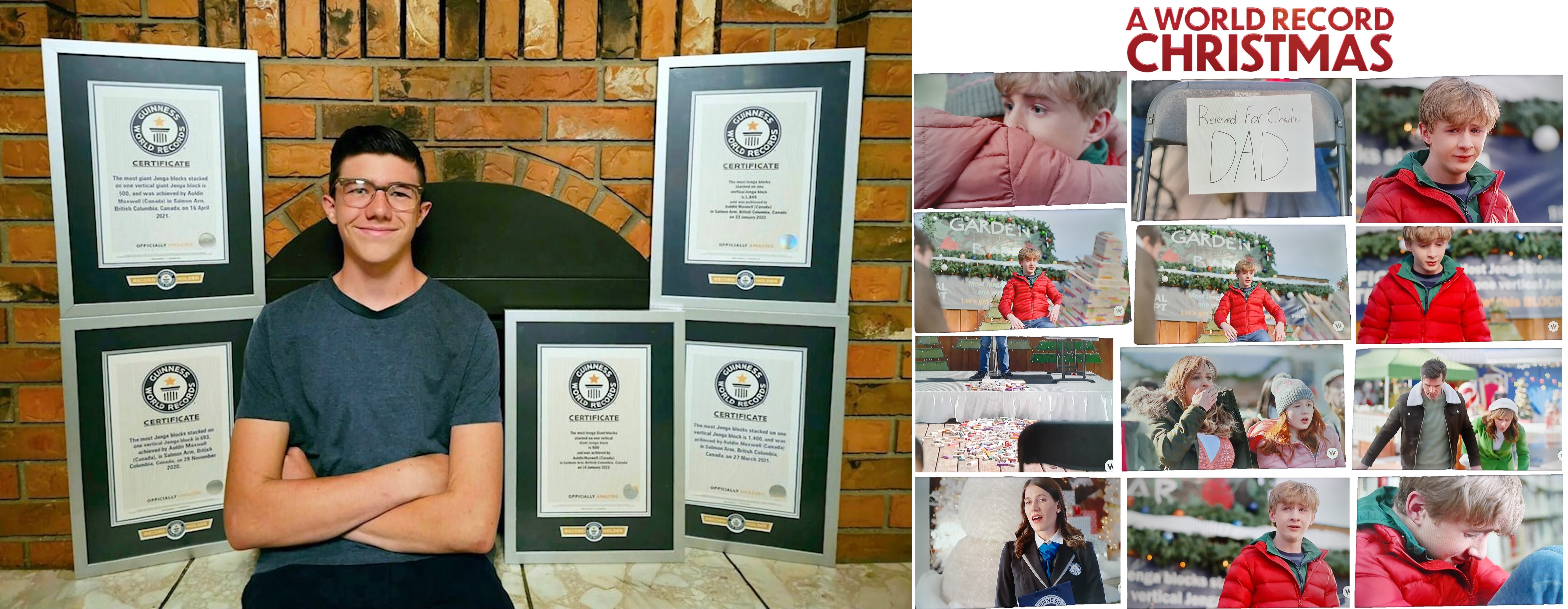My Autistic Perspective on Hallmark's A World Record Christmas (spoilers)

Sometimes, art doesn't imitate life, even when it should.
"Cheer up, Charlie. Just be glad you're you." - Mrs. Bucket, Willy Wonka & the Chocolate Factory
I'm usually wary of Hollywood's depictions of autism, as such portrayals tend to be written and acted by those not on the spectrum. As such, they're often riddled with stereotypes and inaccuracies. I feel we, the neurodivergent community, should write and act, or at least consult, on Hollywood productions about ourselves.
So, I was intrigued by Hallmark's A World Record Christmas, which is inspired by the true story of autistic Guinness World Record holder, Auldin Maxwell, and stars autistic actor, Aias Dalman. This convinced me to lower my guard and watch the film. Here are my thoughts on it.
It was refreshing seeing an autistic character played by an autistic actor. Hopefully, this inspires others on the spectrum to pursue acting. Wouldn't it be nice if we were no longer portrayed by non-autistic actors? No offense to Dustin Hoffman, Ben Affleck, Freddie Highmore, or Jacob Tremblay, but I feel we should represent ourselves onscreen.
Thankfully, the teenaged protagonist, Charlie Parsons, wasn't written as a Rain Man knockoff or autistic caricature of a rude, misanthropic jerk. He's depicted as a nice kid with a goofy sense of humour and many talents. Aias delivered a strong and believable performance, expressing a wide range of emotions with his eyes. Bravo.
I'm also glad Charlie was shown to live in a caring household within a supportive community. Nobody bullies, ridicules, or views him as a burden. He's treated as an equal to everyone around him, and not some poor unfortunate soul to be pitied. Kudos. I applaud the filmmakers on all these strides.
Now, for the missteps that rubbed me the wrong way. Charlie's goals all revolve around either impressing his absentee "real dad", Peter, or his best friend, Amy. He desperately wants to make Peter proud of him, despite having a loving and supportive stepfather, Eric, who already is. He tolerates things he dislikes, such as being called "Chucky", ice skating, and real Christmas trees, just to make Amy happy. Why couldn't he pursue goals solely for his own benefit, pride, and happiness?
I can't speak for anyone else on the spectrum, but I sure as hell never seek the approval of others. I always remain true to myself and embrace my eccentricities. There's real power in that. To be fair, Charlie later expands his goals to include demonstrating he isn't defined by his autism, raising funds for autistic charities, and proving to others on the spectrum they can achieve anything. However, these additional goals feel secondary to pleasing Peter and Amy.
What really pushed my buttons was that Hallmark deviated from its wish granting formula. Hallmark movies always end happily, with their protagonists finding romance and having all their wishes granted. Charlie has wishes, too. Find romance with Amy. Reunite with Peter. And break the Guinness World Record for stacking Jenga blocks. The Hallmark djinn must be on strike, as none of his wishes are granted. Amy doesn't reciprocate his feelings. Peter doesn't care about him. And he accidentally knocks over the Jenga tower, just as he's about to break the world record. Poor Charlie has worse luck than Charlie Brown in The Peanuts Movie.
This would never happen to the protagonist of any other Hallmark movie. Could you picture the big city businesswoman being rejected by the smalltown handyman? Or the interior decorator failing to save the viscount's castle from foreclosure? Not a chance in hell.
I'm guessing these heartbreaks were to illustrate Charlie didn't need his wishes granted to be happy. Amy emphasizes how special he is as her best friend. He realizes Eric was his real dad all along. And he successfully rebuilds the Jenga tower. The Guinness adjudicator won't officially recognize his record but shares how much of a role model he is to her young autistic daughter. Fine, fine. But if you don't need your wishes granted to be happy, why did everyone else have theirs granted, anyway?
Charlie's mother, Marissa, and Eric have a second child. Peter realizes his failure as a father and returns home to the freedom of bachelorhood. Amy seems to reciprocate the feelings of the unseen boy texting her. The town officially breaks a lame Guinness World Record for wrapping the most presents. The Guinness adjudicator makes it home in time for Christmas dinner. Meanwhile, all Charlie gets is a homemade award on the wall for his unofficial record, and the solace of being a huge inspiration to his whole community. Yay, I guess?
In real life, Auldin was victorious in breaking the official Guinness World Record for stacking Jenga blocks. Why ignore this inspirational and remarkable feat in the movie? Why go with such ending if that's not what happened? The epilogue is set one year later. Why not at least hang an official Guinness World Record on the wall next to Charlie's homemade award?
My takeaway from A World Record Christmas is that the autistic community is always the bridesmaid, never the bride. Because we're different, we can't possibly find romance or break world records. We must remain content being eternal underdogs, just so audiences can root for us, admire our grace in failure, and feel all warm and fuzzy inside. Too bad, as I enjoyed most of the film, but the deviation from the true story left a sour taste in my mouth. Oh, well. It's just a movie. As always, love, peace, and chicken grease.